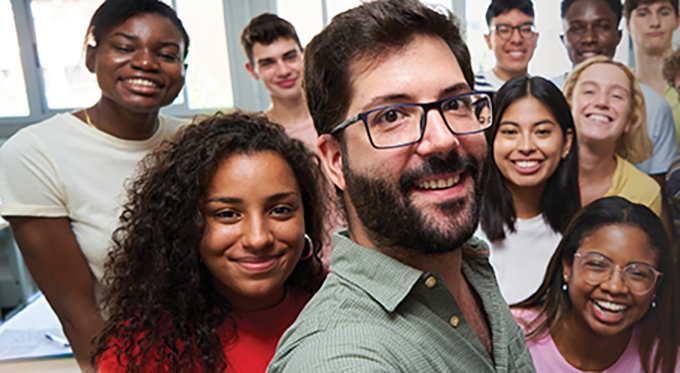 As we enter the final few weeks of the submissions period for the International Literacy Association’s (ILA) awards and grants program, we’re taking a look back at some of our past recipients and their significant contributions to literacy teaching and research.
As we enter the final few weeks of the submissions period for the International Literacy Association’s (ILA) awards and grants program, we’re taking a look back at some of our past recipients and their significant contributions to literacy teaching and research.
In part III of our series (you can read Part I and II here), we continue to delve into the experiences of some remarkable individuals. Each interview provides valuable insights into the impact of being recognized, how grant recipients used their funding, and why they believe initiatives like ILA’s awards program are vital for moving the field of literacy forward.
After reading, don’t forget to follow their advice: Submit a nomination for yourself or a colleague by March 15. There are awards for students, educators, and scholars, and funding opportunities for research that you won’t want to miss.
 Chase Young
Chase Young
Professor, Sam Houston State University
Diane Lapp & James Flood Professional Collaborator Award, 2023 (along with Tim Rasinski)
How did receiving an award from the International Literacy Association (ILA) impact you both personally and professionally?
As many do, I suffer from a bit of imposter syndrome, but seeing our names announced as the winners of this prestigious award eased a bit of that feeling and comically made me think, “Well, I guess I do know what I’m doing.” It was a great shock to be selected and I am proud of the work we have done.
Looking back, how has the recognition and support from ILA motivated you to continue your efforts in advancing literacy, and what future goals do you have in this regard?
We love what we do, and it is always great to know that others appreciate our work. It’s motivating to know that what we do makes a difference in classrooms and ultimately improves literacy outcomes.
 Timothy Rasinski
Timothy Rasinski
Professor Emeritus, Kent State University
William S. Gray Citation of Merit, 2020
Diane Lapp & James Flood Professional Collaborator Award, 2023 (along with Chase Young)
How did receiving an award from the International Literacy Association (ILA) impact you both personally and professionally?
Receiving the William S. Gray Citation of Merit affirmed the four decades of research, teaching, and service to the literacy community. It continues to be the highlight of my career.
Looking back, how has the recognition and support from ILA motivated you to continue your efforts in advancing literacy, and what future goals do you have in this regard?
ILA is now and has been my professional home since entering the literacy education community in the early 1980s. ILA has supported me throughout my professional journey, and more importantly has been a source of support for teachers and students in the development of effective literacy instruction.
How do you believe ILA’s awards and grants program contributes to raising awareness about the importance of literacy and its impact on individuals and communities?
ILA’s award/grants program provides a vehicle for supporting ongoing and novel approaches and research to literacy education. The funding provided by ILA is often not available through other sources.
For educators and researchers considering applying for the current awards and grants submissions period, what advice or insights would you offer based on your experience?
Don’t be shy about your work and your accomplishments. ILA’s awards and grants allow literacy educators to share their work and innovations with the larger professional community.
 Kyley Pulphus
Kyley Pulphus
Founder, We Scribblin’ LLC and Doctoral Candidate, Louisiana State University
Helen M. Robinson Grant, 2023
How did receiving an award from the International Literacy Association (ILA) impact you both personally and professionally?
I was quite humbled to be granted the Helen M. Robinson award for my dissertation. I received many messages of congratulations from members of the ILA community. I felt so seen and affirmed. I was also thankful for the financial support. The costs of conducting research can accumulate quickly, and the stipend made my research more manageable.
Can you share a specific project or initiative that was made possible through the support of the award/grant, and how it has contributed to advancing literacy education?
As a part of my dissertation research, I published a book of youth writing. We celebrated the book release at the Louisiana Children’s Museum (LCM). It was a beautiful event attended by the young writers’ families and friends. The specialness of the moment was so touching to me and the Chief Learning Officer at LCM, Shannon Blady, that we have discussed a potential partnership. We want young people in New Orleans to have the writing skills they need to be successful in their personal and professional lives, and to be celebrated for their hard work. Stay tuned!
How do you believe ILA’s awards and grants program contributes to raising awareness about the importance of literacy and its impact on individuals and communities?
The ILA awards and grants program is so important to the literacy education community. It honors the contributions of outstanding educators who have worked in the field for years, while also recognizing innovative newcomers with great potential for impact. Both are needed to create educational spaces our young people deserve. It’s inspiring and motivating to learn about the people who are doing great things for literacy education

Lori Bruner
Assistant Professor of Early Literacy, University of Alabama
Timothy & Cynthia Shanahan Outstanding Dissertation Award, 2023
Jeanne S. Chall Research Fellowship, 2021
How did receiving an award from the International Literacy Association (ILA) impact you both personally and professionally?
I received both awards at the beginning of my academic career. In both cases, these awards encouraged me to stay focused on my line of research and keep working hard in that direction. In addition, both awards have opened doors for me professionally. For instance, the Jeanne S. Chall Research Fellowship was my first external grant, and it was so helpful to have this experience while on the job market during the COVID-19 pandemic.
If you were nominated by a mentor or colleague, do you know who nominated you? What impact has this person had on your career?
Neither of my awards required a nomination, but my graduate school advisor, Tanya Wright, introduced me to the ILA awards and grants program. She deserves all the credit for both awards and for encouraging me to pursue my current line of research. In the early stages of graduate school, she told me, “People love good ideas.” This advice helped me focus on my own research interests and passions instead of trying to assess what others might think is important—a distinction I still carry with me today.
Can you share a specific project or initiative that was made possible through the support of the award/grant, and how it has contributed to advancing literacy education?
The Jeanne S. Chall Research Fellowship allowed me to expand the scope of my dissertation and recruit more participants for my study. As a result, I was able to record 156 read-aloud sessions with caregivers and their preschool children—a large dataset that has been invaluable at the start of my career. One of the most exciting projects to grow from this dataset has been a comprehensive look at the types of conversations caregivers have with their young children during read-alouds and how their conversational moves compare between printed books and digital stories. This work has contributed new information about how caregivers read digital stories and provided a more nuanced look at previous research findings.
Have there been any unexpected benefits or outcomes as a result of receiving the award/grant that you didn’t anticipate?
One of the most rewarding benefits has been developing relationships with members of the ILA leadership team. I’ve had the chance to interact with people I might not have met otherwise! Through these conversations, I’ve been invited to be an Editorial Review Board member for Reading Research Quarterly, contribute two articles to Literacy Today magazine, and share information for an EdWeek report on digital reading.
For educators and researchers considering applying for the current awards and grants submissions period, what advice or insights would you offer based on your experience?
My biggest advice is to go for it! If you meet the eligibility for an award, there is nothing to lose by applying. It always seems risky to put yourself out there, but remember what brought you to your work in the first place and that these experiences are valuable—both to yourself and to others. Once you start the application, it’s helpful to clearly define the rationale for your work and to be specific about how you see yourself contributing to research and practice.
Karis Jones
Assistant Professor of ELA Education, Empire State University – SUNY
Helen M. Robinson Grant, 2020
How did receiving an award from the International Literacy Association (ILA) impact you both personally and professionally?
I was thrilled to receive the Helen M. Robinson grant. It was the first time my dissertation was recognized as having potential to impact the field. Now I have many pieces published from it in practitioner and research journals!
Can you share a specific project or initiative that was made possible through the support of the award/grant, and how it has contributed to advancing literacy education?
This award supported my dissertation process. Not only did it help me to transcribe my data quickly so I could move on to analysis but also it was great to be able to highlight the award on the job market!
How do you believe ILA’s awards and grants program contributes to raising awareness about the importance of literacy and its impact on individuals and communities?
I appreciated the committee’s commitment to equity and their willingness to recognize literacy projects that attend to cultural relevance and social justice.